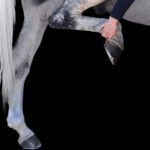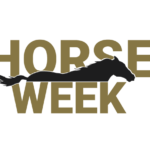 Guenter Seidel and Nikolaus | © Nancy Jaffer
Guenter Seidel and Nikolaus | © Nancy JafferFebruary 23, 2003, Miami, FL — From the minute he went down the center line today, Guenter Seidel was on the money aboard the often-temperamental Nikolaus to win the U.S. League finals for the Dressage World Cup.
Right in rhythm with the notes of “Hernando’s Hideaway,” the Californian nailed his first important statement, a rhythmical piaffe, and went on to produce an errorless 77.65 percent test on his bay partner, who showed a remarkably even mood in the covered arena at Tropical Park.
“He did what’s supposed to happen in a freestyle, really showing off the strong points of the horse,” commented judge Axel Steiner. The result was no surprise to Guenter. “You know in your warm-up how it feels,” he explained, and his big smile said the rest.
So Guenter’s going to Sweden next month to represent the U.S. in the World Cup finals, and he won’t be alone. George Williams, who finished third on the smooth-stepping black mare, Rocher, is going with him.
 Guenter Seidel and George Williams | © Nancy Jaffer
Guenter Seidel and George Williams | © Nancy Jaffer“It’s an unbelievable dream of mine. I am still sort of in shock,” confessed George, his eyes glowing.
Americans have been doing so well in dressage that it was felt they deserved two representatives from the league competition. Debbie McDonald and Brentina — fourth at last year’s World Equestrian Games, barely missing a medal — had already been given a wild card slot for Sweden and didn’t have to travel here from Idaho. While George’s horse has a light and elegant way of going, three obvious mistakes — George attributed them to “rider error” marred his performance. He had a miss in the one-tempi series of lead changes while he “focused too much on the music.”
Then he “became a little rattled” and Rocher cross-cantered in the piaffes to the right. “I was still thinking about that when I made my mistake in the two’s (two-stride lead changes), ” he said.
Otherwise, there was a lot to like in the lop-eared mare’s dance to Madonna music, which George said he picked because he wanted something that reflected her personality. “She’s a very strong woman,” he said of Rocher.
His score was 73.9 percent, to 76.7 percent for Sue Blinks. She was second on Flim Flam with some mistakes of her own to Cirque de Soleil music. The mishaps included Flim’s break from the trot to the canter as she went on a diagonal line, and flinging up his head at the far end of the ring.
George got the Cup nod because Sue was not a candidate for the World Cup. She’s concentrating instead on going to Europe later this year and working with U.S. Equestrian Team Coach Klaus Balkenhol, noting she can’t take too much time away from her business too soon after her long absence in 2002 to ride on the World Equestrian Games silver medal squad, where Guenter was her teammate.
The Cup finals will be tough, even without Holland’s Olympic champion Anky van Grunsven, who was number one in the European League until she broke her leg in a fall (who said dressage was foolproof?) and is recuperating. The biggest obstacle to the first U.S. Cup victory ever will probably be Germany’s European champion, Ulla Salzgeber, with Rusty, who won the freestyle at the WEG. Blinks will be joining the other U.S. representative, Debbie McDonald with Brentina, in Sweden. McDonald, who narrowly missed an individual medal in the WEG when she was edged by Salzgeber, got a wild card invitation to the Cup finals and didn’t have to compete here. But the U.S. side is expecting great things, because this is the strongest (and largest) contingent America has ever sent to Europe for the finals.
The finals were also USA Equestrian’s U.S. Freestyle Championship. Unlike the finals, the championship also counted scores in Saturday night’s Grand Prix, which was won by George with 70.64 percent.
It wasn’t an easy competition for either Guenter, second on 70.32 percent or Sue, third with 69.24. The warm-up ring was dark, a sharp contrast to the indoor ring, which someone described as “lit up like a movie set.”
Riders had complaints about the facility, noting they and officials were out raking the footing in the warm-up ring yesterday, which wasn’t helped by a Saturday evening rainstorm. Someone suggested that events like this require a covered warm-up as well as a covered arena.
Klaus Fraessdorf, the show’s manager, said a commissioner from Miami Dade County, which runs the park, attended Saturday and promised to improve conditions. He noted, however, he will not accept running any competition until he gets satisfaction, rather than promises, that conditions are up to snuff. While saying the riders were “75 percent right” in their criticism, Klaus pointed out tongue-in-cheek that the top score was 77 percent “in a very lousy place. If it was in a great place, it would have been 98 percent.”
 The blind Valiant with rider Jeanette Sassoon and her fiance Gary Fellers | © Nancy Jaffer
The blind Valiant with rider Jeanette Sassoon and her fiance Gary Fellers | © Nancy JafferWhile the focus here naturally was on the World Cup contest, Jeanette Sassoon nearly stole the show with her blind mount, the aptly-named Valiant. He gave a remarkable freestyle demonstration to the music of Camelot — despite the fact that he is completely blind.
This black home-bred gelding lost his eyesight to an infection he suffered after a bad reaction from penicillin six years ago. The vets advised Jeannette she had two choices: turn Valiant out in a treeless field for the rest of his life, or put him down. Jeanette, one very determined lady, would have none of that. She told the vets, “I’m going to train him to the highest level of dressage I can.”
They were stunned. “They looked at me like I was crazy,” she recalled.
But love, trust and patience triumphed. She now shows Valiant, who has scored in the high 60 percent range in competition, and works at Prix St. George level.
Through the Dutchbred Valiant, Jeanette has learned a lot of about human/animal communication, and she has started a foundation in her mount’s name that will explore that topic and others further further. The biggest lesson she has learned from her experience with Valiant is that people should “listen” to their animals, with their whole being. “They’re always talking to us,” she said.





